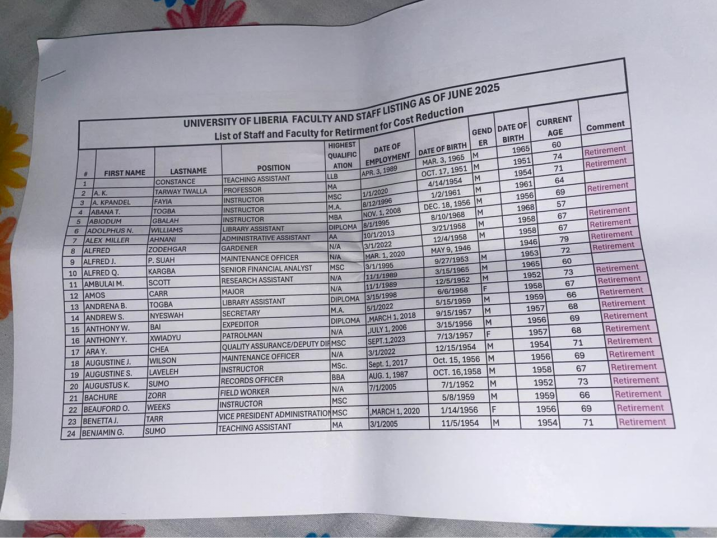The University of Liberia (UL) is embroiled in controversy over a proposed cost-saving measure that could lead to the retirement of over 200 faculty members. A leaked document, purportedly listing the names of those targeted for retirement, includes prominent figures like former Central Bank Governor Dr. Mills Jones and Ex-executive director of the Environmental Protection Agency, Professor Wilson Tarpeh. This proposed mass retirement, allegedly orchestrated by Interim Vice President for Finance and Fiscal Affairs Dr. Lester Tenny and awaiting approval from UL President Dr. Ophelia Maparyan, has sparked widespread criticism and accusations of a politically motivated purge.
Critics allege that the retirements are not driven by legitimate financial concerns, but rather by Dr. Maparyan’s desire to install loyalists within the university. They point to the recent hiring of approximately 50 individuals, formerly laid off by USAID, who have been rapidly integrated into the UL faculty, holding positions ranging from Assistant Professor to Associate Professor. This influx of new appointees, critics argue, necessitates the removal of established faculty members to create vacancies, effectively replacing experienced educators with those deemed more politically aligned with the current administration.
The forced retirement of seasoned professionals like Dr. Jones, Professor Cooper, and Professor Tarpeh raises significant concerns about the potential loss of institutional knowledge and academic expertise. These individuals represent decades of experience, research contributions, and dedication to the University of Liberia. Their departure could severely impact the quality of education and research, undermining the institution’s academic standing and reputation. Furthermore, critics fear that such actions create a chilling effect on academic freedom, discouraging independent thought and dissent within the university.
The controversy highlights a growing concern about the politicization of the University of Liberia. Critics argue that Dr. Maparyan’s alleged actions prioritize personal loyalty over meritocratic principles, threatening the integrity and autonomy of the institution. Replacing experienced faculty with potentially less qualified appointees solely based on political allegiance could erode the university’s credibility and hinder its ability to fulfill its educational mission. This perceived power grab raises fundamental questions about the future direction of the UL and its ability to maintain its standing as a respected academic institution.
Attempts to obtain official responses from the university administration have been unsuccessful. Cllr. Noris Tweah, Vice President for University Relations, declined to comment, citing being outside of working hours and engaged in personal activities. This lack of transparency and unwillingness to address the concerns surrounding the proposed retirements further fuels suspicion and anxiety among faculty and staff. The absence of clear communication from the administration exacerbates the sense of unease and distrust within the university community.
The unfolding situation at the University of Liberia underscores the importance of preserving academic freedom and upholding meritocratic principles within educational institutions. The alleged manipulation of faculty appointments for political gain sets a dangerous precedent, potentially undermining the quality of education and eroding public trust in the university. The controversy necessitates a thorough and transparent investigation to determine the true motivations behind the proposed retirements and ensure that decisions are made in the best interests of the university and its students. The future of the UL hinges on upholding its core values of academic excellence, integrity, and independence from political interference.














